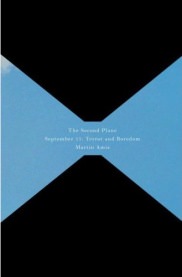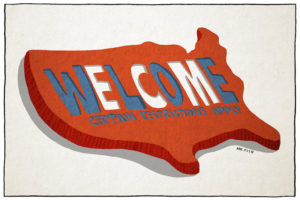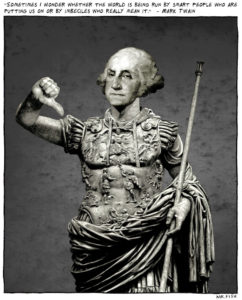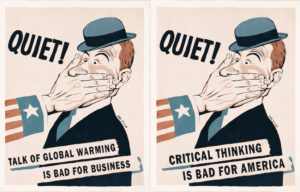Troy Jollimore on Martin Amis’ ‘The Second Plane’
When the second plane hit the second skyscraper on 9/11, how many of us knew then just how radically our world would change?
The second plane, as no one needs to be told, was the one that hit the World Trade Center’s second tower. And it was the one which, as Martin Amis found himself writing within a few days of the event, utterly annihilated the hope that what was happening that September morning might have been nothing more than a terrible, tragic accident: “That was the defining moment. Until then, America thought she was witnessing nothing more serious than the worst aviation disaster in history; now she had a sense of the fantastic vehemence ranged against her. … That second plane looked eagerly alive, and galvanized with malice, and wholly alien. For those thousands in the South Tower, the second plane meant the end of everything. For us, its glint was the worldflash of a coming future.”
Amis, of course, is best known as the author of such novels as “The Information,” “Money” and “London Fields.” His most frequent fictional mode is a species of carefully observed, somewhat brutal and frequently hilarious social satire. But his new book, “The Second Plane: September 11: Terror and Boredom,” is a pure product of the “coming future” he speaks of here, a book fully shaped by the single event that many take to have defined our era. “The Second Plane” collects 14 of Amis’ recent short works: essays, reviews, a pair of short stories. Granted its unifying theme, the book is still something of a hodgepodge; it was clearly not conceived as a cohesive work. But the pieces’ very lack of unity feels somehow appropriate to the subject. Here are 14 attempts, each one almost self-confessedly a failure, to respond in an adequate way to what cannot adequately be responded to.
“The Second Plane” affords an interesting opportunity: to watch an intelligent person trying, over time, to think through the unthinkable turn his reality has taken. “I have cut nothing,” Amis remarks in his author’s note, “briefly tempting though it was, at times, to cover my tracks.” These tracks, and the evolution of the author’s desires to cover them, are perhaps the most interesting aspect of the book. Amis’ views on some matters remain fairly constant: He is reliably critical both of the Bush presidency and of the Iraq war, for example. But his thoughts on the book’s deepest question — what are the obligations that violence, and in particular mass slaughter, thrusts upon us as inhabitants of the world in which it occurs? — undergo a quite noticeable transformation over the six years the book’s writings represent.
The opening piece, “The Second Plane,” was published a mere week after September 11. Here we find Amis shocked and bewildered, but interestingly open-minded and up to the challenge of thinking about the terrorist act in all its aspects and implications, up to and including a consideration of why the terrorists did it: “It will also be horribly difficult and painful for Americans to absorb the fact that they are hated, and hated intelligibly. How many of them know, for example, that their government has destroyed at least 5 percent of the Iraqi population? How many of them then transfer that figure to America (and come up with fourteen million)? Various national characteristics — self-reliance, a fiercer patriotism than any in Western Europe, an assiduous geographical incuriosity — have created a deficit of empathy for the sufferings of people far away. … Unless Pakistan can actually deliver bin Laden, the American retaliation is almost sure to become elephantine. Then terror from above will replenish the source of all terror from below: unhealed wounds.”
Of all the possible cuts that must have tempted Amis, the one that was most difficult to resist was surely that word intelligibly. For the idea that America was intelligibly hated — the idea that any aspect of the terrorists’ sentiments and actions could be considered even minimally intelligible or rational or comprehensible — is precisely what he would come to want to deny. This is nowhere more evident than in the author’s note: “The first piece — published on September 18, 2001 — has a slightly hallucinatory quality (it is fevered by shock and by rumor), and also indulges in what Paul Berman, the author of Terror and Liberalism, has called ‘rationalist naïveté’ — a reflexive search for the morally intelligible, which always leads to the chimera of ‘moral equivalence.’ ”
By Sept. 18 many people, particularly in the United States, had decided that understanding the terrorists’ motives, not to mention the American foreign policy decisions that had helped form the background for the attacks, was precisely the last thing they wanted to do. (Amis, apparently, took somewhat longer to come around to this point of view, but eventually he did.) This refusal to reflect, to investigate, to learn, still seems regrettable, but the reaction is perhaps not impossible to understand. In the shadow of an atrocity of this magnitude, any attempt at explanation might be seen as amounting to the suggestion that the victims “had it coming.” One wants to retort that this worry is ungrounded: It is acknowledged by all reasonable parties that no one could possibly have had this coming, whatever damage American foreign policy might have done. Still, the worry persists, particularly in light of the knowledge that not all of the concerned parties are reasonable, that there are those who will take any proffered explanation of the terrorists’ actions as amounting to a justification.
The temptation, in the light of this, is to insist on regarding the attacks as an incomprehensible event, something so alien to our sense of morality that any attempt to penetrate its baffling surface is doomed to failure, and indeed risks pulling us into the moral void that lies at its core. The perpetrators are not to be regarded as rational agents, and certainly not as political actors, but as the exact opposite, members of a “death cult” that rejects reason altogether: “Thanatism derives its real energy, its fever and its magic, from something far more radical. And here we approach a pathology that may in the end be unassimilable to the non-believing mind. I mean the rejection of reason — the rejection of the sequitur, of cause and effect, of two plus two. … To transcend reason is of course to transcend the confines of moral law; it is to enter the illimitable world of insanity and death.” It should probably be acknowledged that in at least some cases, the “death cult” description rings reasonably true. Still, one can’t help but think that there remains something we ought rationally to try to understand, and that is the surprising and distressing level of identification with the perpetrators of 9/11 among moderate Muslims who cannot be written off as being brainwashed by a death cult, who in fact seem to have values rather similar to those values Westerners claim as their own. Moreover, one must take seriously the fact that, against the background of the religious claims the members of the “death cult” accept, even they can be viewed as displaying a kind of disturbing, perverse rationality — so long as one manages to forget how irrational one needs to be to accept such beliefs to begin with.
What of “the chimera of ‘moral equivalence’ “? Here, too, one might feel considerable sympathy for Amis’ position while nonetheless hesitating to completely endorse his stance. The trouble is that “moral equivalence” can mean two very different things. First, the phrase can stand for the idea that what the terrorists have done is no worse, from a moral point of view, than what our governments have done. Let us suppose that Amis is right to reject it in this sense. (I will return to this question.) Still, there is a second sense of moral equivalence that needs to be distinguished: the idea that everyone, including the radical Islamists and including ourselves, should be held to the same moral standards.
In this sense, “moral equivalence” amounts to a claim of moral universalism. And this, too, is an idea that many would deny. Indeed it seems to constitute a kind of moral common sense among a significant number of Americans that American actions are not subject to evaluation by the same standards as are the actions of others — a fact about which Amis, early in the book, displays an admirable awareness: “Most crucially, and again most painfully, being right and being good support the American self to an almost tautological degree: Americans are good and right by virtue of being American. Saul Bellow’s word for this habit is ‘angelization.’ ”
Amis is correct here to draw a link between this odious form of American exceptionalism, according to which we can do no wrong (the sort of thinking that justifies our belief in the legitimacy of our possessing weapons of mass destruction while being morally affronted at the thought that any other nation might want to possess them), and the lack of concern in this country for the suffering of others. The American media pay vastly more attention to the American body count in Iraq than to the much larger number of Iraqi civilian deaths; relatively few Americans seem troubled by the latter figure, or have cited it as a compelling objection to the Iraq war.
American right-wing thinkers have tended to encourage this “angelization” by reacting with overstated outrage to any suggestion that residents of the Western world be treated as inhabiting the same moral universe as the terrorists (or, in all too many cases, as Muslims or Arabs in general). Against this background, Amis needs to work somewhat harder to separate himself from this position, to close off the possibility that his somewhat vitriolic denunciations of the idea of moral equivalence might be read as the claim that nothing we do could possibly be as bad as what the terrorists have done — when what he seems to want to say is that as a matter of substantive fact, and as measured by moral standards applying to all, what the terrorists have done does indeed turn out to be worse than anything we have done.
Moreover, the substantive issue is not quite as straightforwardly obvious as Amis would appear to think. One needs at least to acknowledge that both the U.S. and Britain have engaged in the intentional mass killing of civilians: the indiscriminate bombings of German and Japanese cities in World War II. This is not to equate the two cases from a moral point of view. The bombings of German and Japanese civilians were strategic, and seen as means to an end — means, indeed, toward the end, that is, the end of the war. The architects of September 11, by contrast, killed as an expressive act, in which what was expressed was a passionate and genocidal rage, expecting nothing to come of it but death, destruction and terror. They killed to increase killing, indeed to inspire it, not to end it.
So Amis is right that the more correct comparison is with what the Nazis did, and not with what the Americans and British did, in World War II. Still, he ought to have mentioned the latter, as ought all who treat with contempt the idea that there is any sort of moral equivalence to be found here. The bombing of German and Japanese cities was not morally equivalent to September 11, but there is an important commonality: They both involve the intentional mass killing of civilians, which is never permissible or justifiable. We can emphasize this while still insisting that the existence of the earlier case does absolutely nothing to justify the latter, and that the comparison of the two cases does not at all decrease the gravity of the September 11 attacks, let alone somehow render them excusable. In fact its effect should be the opposite: to remind us of how serious, and how unforgivable, are some of the things that have been done in our name.
There is a certain tendency to treat jihadists as if they have simply pulled out of thin air the idea that parts of the Quran seem to advocate violence against non-Muslims. It would be considerably more pleasant, of course, if there were no such passages to be found. But there are, and so moderates find themselves needing some way of trying to render them palatable.These days, the attempt is frequently based on a “partners in crime” approach. When one of the participants in a public discussion points out that the Quran does, in fact, contain passages which at least apparently condone violence against non-Muslims and other barbarities, it is almost certain that someone will respond with, “Ah, but so does the Bible.” So a passage in which Allah calls for the mass slaughter of non-Muslims is juxtaposed with, say, Deuteronomy 20:17. (“But thou shalt utterly destroy them; namely, the Hittites, and the Amorites, the Canaanites, and the Perizzites, the Hivites, and the Jebusites; as the LORD thy God hath commanded thee.”) It is thus supposed to be established that we, as members of a culture shaped by Christianity, are in no position to criticize the Quran for whatever injunctions to violence it might contain.
The popularity of this strategy is both perplexing and appalling. Why is the comparison supposed to carry any weight at all? Why, that is, are we to assume that when someone is criticizing the Quran, he or she is doing it from a Biblical perspective? Why can’t we reject both? Amis would reply that we can, and should — indeed, we can and should — reject them all: “Since it is no longer permissible to disparage any single faith or creed, let us start disparaging all of them. To be clear: an ideology is a belief system with an inadequate basis in reality; a religion is a belief system with no basis in reality whatever. Religious belief is without reason and without dignity, and its record is near-universally dreadful. It is straightforward — and never mind, for now, about plagues and famines: if God existed, and if he cared for humankind, he would never have given us religion.”
This hostility toward religion will displease both moderates and extremists. Amis might seem more tolerant elsewhere, when he draws the distinction between fear of Islam, and fear of Islamism: “I was once asked: ‘Are you an Islamophobe?’ And the answer is no. What I am is an Islamismophobe, or better say an anti-Islamist, because a phobia is an irrational fear, and it is not irrational to fear something that says it wants to kill you.”
But this need not — and, in Amis’ case, does not — imply a tolerance toward moderate religion in the philosophical or emotional sense. To say that we should not fear moderate religion is not to say that we should admire or embrace it. Nor does either amount to a claim about whether moderate faith should be legally or politically tolerated. Nowhere in “The Second Plane” is it suggested that anyone ought to be denied the right to believe and practice Islam, or any other faith. It is perfectly consistent to claim that “[t]oday, in the West, there are no good excuses for religious belief — unless we think that ignorance, reaction, and sentimentality are good excuses,” while allowing that people have the right to act in ways for which they have no good excuse, so long as they do not infringe other people’s rights in the process.
Amis is, moreover, perfectly on target when he decries the current tendency to identify moderate religion as the mainstream, and to treat skepticism and, in particular, atheism as kinds of extremism — mirror images, as it were, of religious fundamentalism: “In this general view, fundamentalists are on one wing, atheists are on the other, and the supposed center is occupied by moderate believers and a few laconic agnostics. Secular fanaticism, secular hatred — these equivalencies are fictions. … The key point, of course, is that secularism contains no warrant for action. One can afford to be crude about this. When Islamists crash passenger planes into buildings, or hack off the heads of hostages, they shout, ‘God is great!’ When secularists do that kind of thing, what do they shout?”
This is, indeed, somewhat crude, but it is, perhaps, refreshingly crude: There is a truth here that is too infrequently expressed. (One can’t help but wish, though, that Amis had mentioned the second key difference, which is that the standard skeptic, unlike the typical religious believer, is able to say what evidence it would take to make her change her beliefs.)
Amis’ comments in a 2006 interview with The Times of London were cruder still, and less defensibly so. There, he seemed to suggest open discrimination against Muslims and “people who look like they’re from the Middle East or from Pakistan” — measures including travel restrictions and, potentially, deportation — in order to encourage the community to crack down on its more violent members. Amis has since distanced himself from these remarks, claiming that he was not making a serious policy suggestion but simply “conversationally describing an urge — an urge that soon wore off.”
One might well hesitate to let him off quite so easily: The remarks really were not only, as he himself now admits, “stupid,” but deeply offensive. (Such overtly discriminatory policies have something important in common with terrorism: They violate the rule that the innocent are not to be punished for the crimes of others.) On the other hand, the price of engaging in moral thought in a serious way — rather than simply standing on the sidelines and muttering platitudes about the goodness of peace and tolerance — is that one will on occasion give offense, including legitimate offense; and the only way to guarantee that one never hits the wrong target is to avoid taking any sort of stand at all. This is clearly a price Martin Amis is not willing to pay. In response, his intellectual opponents have attempted to dismiss his criticisms of militant Islamism as nothing more than intolerant expressions of right-wing prejudice. But this charge is badly overinflated. If Amis’ writings are intolerant, then it is intolerance of an admirable sort — the attitude that refuses to tolerate the oppression of, and the infliction of violence on, women, nonbelievers and others. Jihadism, as Amis recently told Rachel Donadio of The New York Times, is “racist, homophobic, totalitarian, genocidal, inquisitorial and imperialistic. Surely there should be no difficulty in announcing one’s hostility to that, but there is.”
Troy Jollimore is Associate Professor in the philosophy department at California State University, Chico. His reviews and essays have appeared in venues including the San Francisco Chronicle, the Boston Book Review and St. Louis Magazine. His first book of poetry,”Tom Thomson in Purgatory,” won the National Book Critics Circle Award in 2006.
Your support matters…Independent journalism is under threat and overshadowed by heavily funded mainstream media.
You can help level the playing field. Become a member.
Your tax-deductible contribution keeps us digging beneath the headlines to give you thought-provoking, investigative reporting and analysis that unearths what's really happening- without compromise.
Give today to support our courageous, independent journalists.






You need to be a supporter to comment.
There are currently no responses to this article.
Be the first to respond.